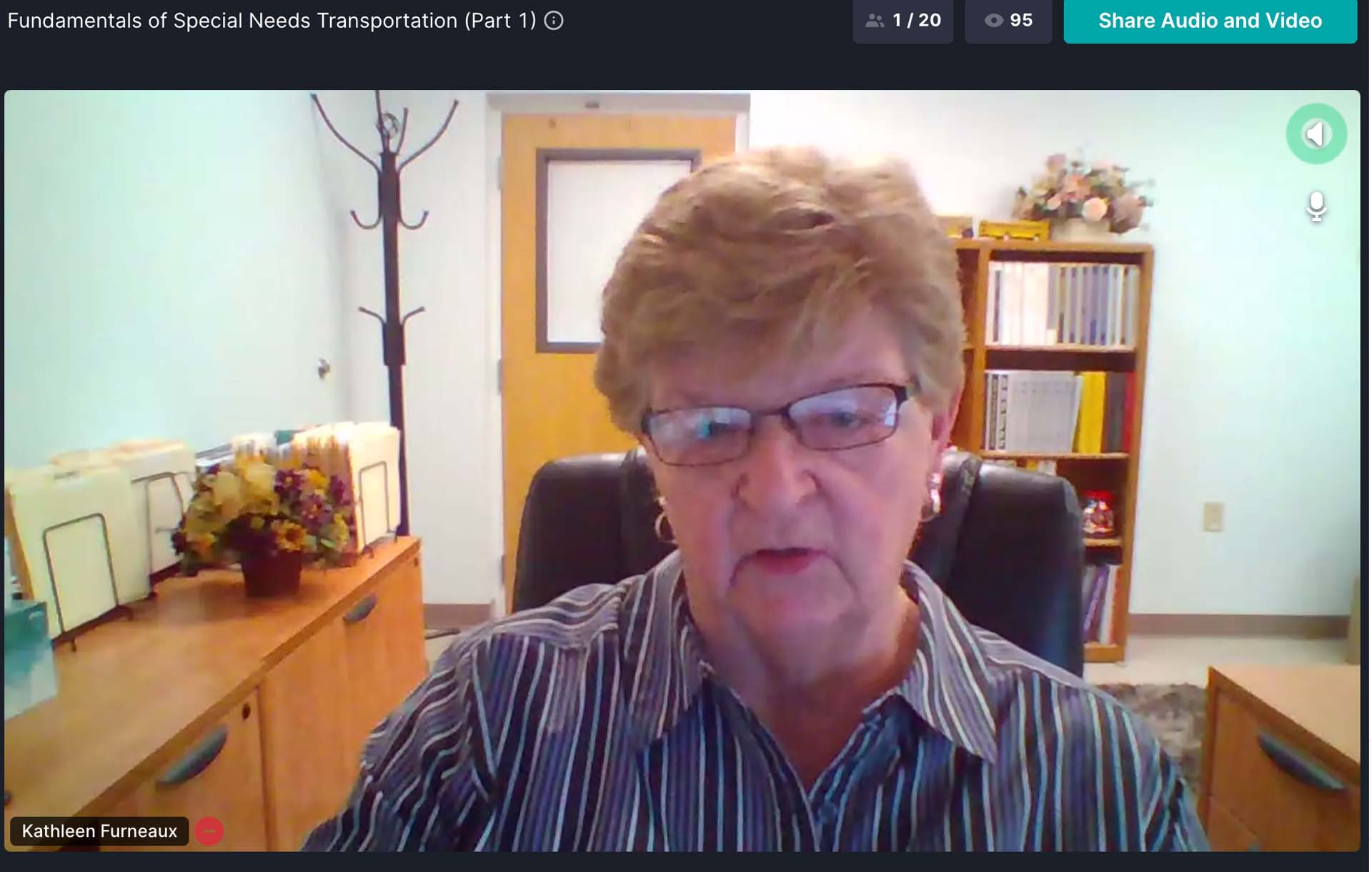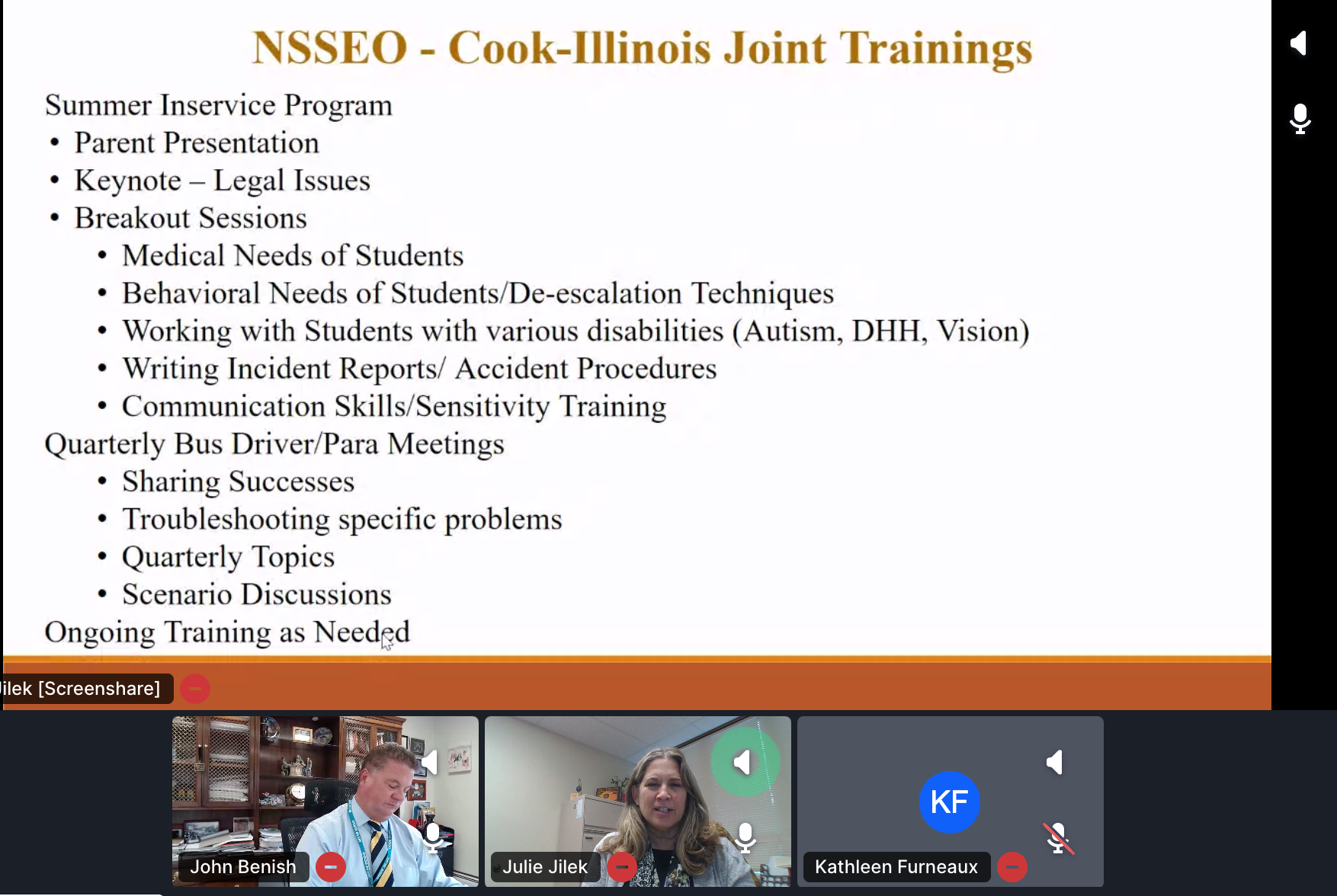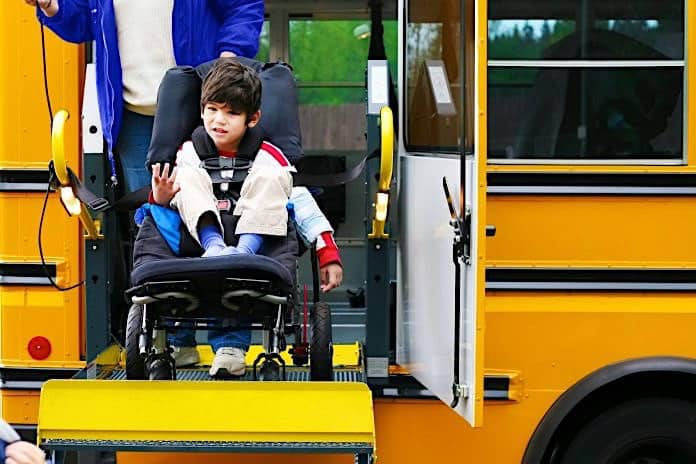A three-part series on the Fundamentals of Special Needs Transportation was offered to attendees at this year’s virtual Transporting Students with Disabilities and Special Needs Conference.
The first part of the series, as discussed by Kathleen Furneaux, executive director of the Pupil Transportation Safety Institute, on Nov. 9 shared what school bus drivers have a right to know when it comes to the students they are transporting.
Furneaux explained that when she first started in transportation, the Individuals with Disabilities Education Act (IDEA) wasn’t fully documented in the transportation process or in each student’s individualized education program (IEP). However now, she said IDEA sets the stage for transportation services that students with disabilities need.
Getting Transportation Involved
Furneaux said as more students need to be transported, industry professionals need to be asking how they can provide the best service. She said transportation operations need to be proactive in collaborating with the special needs department to see the unique needs of every student.
She said one way to involve transportation is for staff members in IEP meetings, at least those that cover transportation requirements, challenges or changes. At a minimum, she suggested that student transporters should create a list that includes some questions that should be asked at those meetings and share those with the IEP team.
Katrina Falk, transportation director for Shelby Eastern Schools in Indiana, commented in the session chat that her frustration is a lack of follow-through.
“I have a great relationship with our special education director,” Falk shared. “We’ve developed processes and forms. Somewhere, though, they get sidelined, and the schools fall back into their old ways. I’m still working through this. A previous special education director had zero expectations from the schools for two-way communication with transportation, and that seems to be a lot of the problem still.”
Furneaux added that because no one knows the school bus like a school bus driver, it’s important for transportation to be involved in some way during the IEP process. She said when planning for the least restrictive environment for a student, Furneaux recommends starting with a big bus, then adding a monitor if the big bus isn’t working and then slowly working down the bus size. “It’s trial and error,” she said.
She added that the goal is to achieve the highest level of success with the lowest level of accommodations. “Pay attention to the warning signs” she added.

Chris Mulhern, the administrator of special education and programs at Washoe County School District in Reno, Nevada, suggested in the session chat to hold monthly meetings with the district’s special education department to remind them that transportation is there to help and answer concerns.
“It has been helpful for us to prepare for new students, preparation for conference weeks or extended school year,” he said. “Gets the ball rolling so we are proactive and not reactive.”
Part two of the workshop the next day focused on collaboration between transportation and special education programs. John Benish, chief operating officer for contractor Cook-Illinois Corporation, and Julie Jilek, assistant superintendent of business services at Northwest Suburban Special Education Organization near Chicago, discussed the shared goal of a successful transportation partnership and how to provide safe, reliable and efficient transportation to students to and from home. It starts with communication, they agreed.
Not only do school districts need to have inter-department communication regarding the transportation of students with special needs, but transportation departments and their contractors also need to have that communication.
Benish said school busing is a team sport, and contractors need to work with districts and school administrators, as each provides the glue that connects the students and their parents to district programs.
Jilek echoed that statement, saying that the drivers she oversees have worked with the same students year after year and are building relationships. She explained that everyone needs to be involved and the expectations of transporting, for instance, whether or not students can be released if a parent isn’t at the bus stop.
Benish added that school bus drivers already have their hands full on their routes, so the district or company needs to make the job easier by setting clear expectations. For instance, what happens when a child gets sick? Are there clear accident procedures in place?
He said it is good to review and discuss these topics prior to the first day of school, adding that it’s important to talk to teachers or parents to see if they can provide little hints to make the school bus ride easier for the students and drivers involved.
While he said it’s almost impossible to attend every IEP meeting, echoing what Furneaux said on day one, he said drivers should try and get as much student information at the beginning of the school year as they can.
Denetria Clayborn, a special needs route coordinator for Prosper ISD in Texas, asked via the chat for advice on protecting the privacy of the students while providing drivers with the transportation form from the IEP.
Jilek said her team looks at her contracted transportation as an extension of her staff. She said transportation staff needs to keep the information confidential, but they need the information for a safe bus ride. She noted transportation departments and contracted drivers are better at knowing that information than not knowing.
The final fundamentals session was held on Nov. 11 and featured Benish and consultant Alexandra Robinson. Previous sessions discussed the law of transporting students with special needs and the need for collaboration. However, Robinson noted the final session was focused on practical, real-life operations.
She explained how every single attendee attending the session is an educator, and how the school bus driver has the ability to make or break a student’s day. She explained that not everyone is going to get along, and because children sometimes try to act like little adults, they may simply not like their school bus driver. And that’s okay, she said.
Robinson circled back to points made in previous days’ sessions on how other departments are less likely to engage transportation when planning student service, and that transportation departments need to take the initiative and not wait for an invitation to the table. Robinson said if a school bus driver notices that something isn’t working with a student’s IEP, the driver should feel empowered to call the team back together and rediscuss the issue.
She said substitute drivers being used on an IEP route, especially with the ongoing driver shortage and increased sick leave due to the pandemic, need to be given all the tools to succeed, just as the regular route driver would be given. She said make sure the drivers have the right equipment and have everything in place to implement a Plan B if something doesn’t work or something unexpected happens. She provided an example of a bus driver being surprised one morning when a student in a wheelchair is waiting at the stop.
Mulhern with Washoe County School District added in this session chat that, “As more and more drivers are excluded due to COVID-19 exposure in our district, it is so important for the regular driver to keep the route packet up to date with all the tools the substitute needs to manage the students. Communication has certainly improved with our driver staff.”
To help with the sharing of information, Benish provides sub drivers with a notebook that contains certain student information that they may need to know, such as the presence of a heavy electric chair or certain allergies. This could help make the substitute school bus driver feel much more comfortable while on the route.
Robinson advocated for computerized routing software, as it allows for notes to be added to better streamline the documentation process.
Student Behavior
Behavior was another factor discussed by all session leaders during their fundamental sessions. Furneaux explained that when students with special needs act out, transportation officials need to look at what the behaviors are and how they align with the respective diagnoses. She said sometimes the school bus driver and the attendant could contribute to the behaviors.
Furneaux recalled one instance when a red shirt worn by a school bus driver triggered an outburst by a student.
Related: TSD Virtual Debunks Common Assumptions When Transporting Students with Special Needs
Related: Medical Expert Breaks Down Guidance of Transporting Students Amid COVID-19
Related: Temple Grandin Shares Expert Perspective on Autism Spectrum During TSD Virtual
Related: School District, Bus Contractor Partnerships Vital When Transporting Special Needs Students
Related: District Support of Parental eLearning Development Vital for Students with Disabilities
Attendee Monica Delgado, a routing and special needs manager at Northside Independent School District in Texas, asked if transportation can be denied or canceled based on a student’s behavior. Furneaux advised against that. She said if transportation is part of the related service and it is stated on the student’s IEP, then transportation is required.
Robinson reminded attendees during her session that student transporters should always separate the behavior from the child. She advised transporters to avoid forming preconceptions of the children, especially if they transported them in previous years and things didn’t go well.
She encouraged attendees that if things aren’t going well, to take those three seconds and breath. Robinson reminded everyone that they are adults and shouldn’t hold grudges towards the students.
She also added that it’s okay to not know all the answers. Sometimes asking the student what he/she thinks should be done is a great tool to use, she advised.
Training
Benish explained that there are so many different types of students with special needs, and school bus driver training should cover everything from how to drive a bus and operate a wheelchair lift, to student passenger and behavior management.
Jilek said the training she provides in collaboration with Cook-Illinois consists of breakout sessions covering medical needs, de-escalation techniques, and writing incident reports, to name a few topics. She said not only are the school bus drivers invited, but drivers from taxi cab companies and other member districts are encouraged to participate.

She said quarterly meetings also give drivers a chance to share successes and to bond over ideas and strategies. She advised starting these meetings with the good, before transitioning to what isn’t going well.
Jilek said the quarterly meetings can focus on one special topic. For instance, this time of year her operation focuses on severe weather, and if school bus drivers know where to stop when it’s not safe to continue driving.
Benish added that the drivers are on the frontlines and are therefore the experts about their routes. He advised attendees to pull their drivers aside every month or so and sit down with them for half an hour to talk about how things going.
Jilek also advised randomly pulling video from buses to recognize the good behavior caught instead of always focusing on the negative behavior. She said more often than not, the crazy one-in-a-million stories make the headlines, but transportation directors and supervisors should try to also focus on the great day-to-day stories.
Benish advised attendees to take information away from this conference, and similar ones, to present back to the administration. He advised to not keep the information to oneself but to say, “I learned this, and I think we should this.”
















